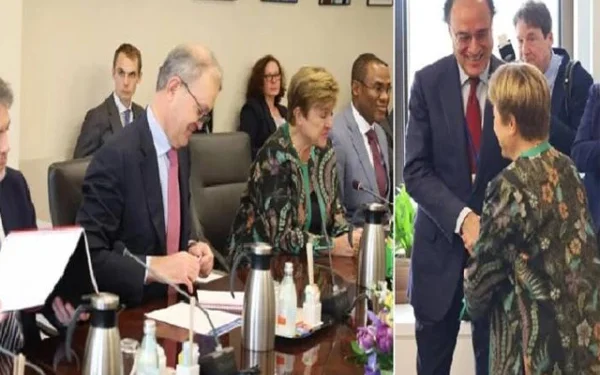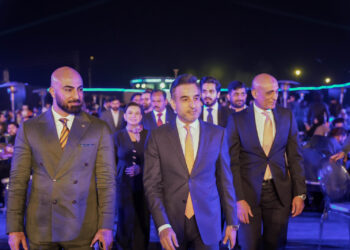Washington, D.C. — In a series of important engagements on the sidelines of the Spring Meetings of the International Monetary Fund (IMF) and the World Bank, Pakistan’s Federal Finance Minister and Senator Muhammad Aurangzeb held significant discussions with leading representatives from international financial institutions and global banking giants. The meetings, held in Washington, were aimed at strengthening Pakistan’s economic partnerships, promoting investment opportunities, and showcasing the progress Pakistan has made in economic reforms and financial stability.
Strengthening Ties with International Financial Institutions
During his visit to Washington, Senator Muhammad Aurangzeb engaged with institutional investors from around the world. These interactions were part of Pakistan’s broader strategy to rebuild trust and cooperation with global financial players.
The Finance Minister provided a detailed overview of Pakistan’s current economic situation, highlighting key fiscal and monetary developments over the past year. He emphasized the government’s focus on structural reforms, stressing that these reforms were crucial for putting the country’s economy on a sustainable growth trajectory.
He pointed out that Pakistan’s economic strategy now prioritizes fiscal discipline, revenue generation, export-led growth, and financial sector stability, all of which are beginning to show positive results.
Key Highlights of Discussions with Investors
Pakistan’s Economic Resilience and Positive Indicators
Minister Aurangzeb shared with investors that Pakistan’s economy, despite global headwinds, has demonstrated resilience. He explained that:
- The government had successfully contained inflationary pressures.
- The Pakistani Rupee had stabilized against major currencies.
- The country’s foreign exchange reserves were improving, aided by strong remittance inflows and a careful import management strategy.
- The successful completion of an IMF Stand-By Arrangement (SBA) had significantly bolstered investor confidence.
He also mentioned the improvement in Pakistan’s sovereign credit rating. International ratings agency Fitch Ratings upgraded Pakistan’s long-term foreign currency issuer default rating to ‘B-‘, reflecting enhanced financial stability and reduced default risks. This upgrade serves as a strong signal to global investors about the robustness of Pakistan’s ongoing economic reforms.
Interactive Question and Answer Session
Following his detailed briefing, Senator Aurangzeb participated in a question and answer session with the investors. This session provided an opportunity for the participants to directly engage with the Finance Minister on:
- Pakistan’s future economic strategy.
- Debt management plans.
- Privatization of state-owned enterprises (SOEs).
- Prospects for foreign direct investment (FDI).
- The role of the private sector in economic growth.
The Finance Minister responded candidly, reiterating that the government is committed to a market-driven economy, encouraging private sector growth, and maintaining transparency in economic policies.
Meeting with Deutsche Bank Delegation: Expanding Financial Market Access
In another significant engagement, Federal Finance Minister Muhammad Aurangzeb met with a high-level delegation from Deutsche Bank, led by Ms. Maryam Vazani, Managing Director for the Middle East and North Africa (MENA) region.
The meeting focused on exploring opportunities for Pakistan’s return to the international financial markets. The discussions were centered around innovative financial instruments that could broaden Pakistan’s investor base and improve liquidity.
Key Topics Discussed with Deutsche Bank
Issuance of Panda Bonds
One of the highlights of the meeting was the discussion on the issuance of Panda Bonds—renminbi-denominated bonds issued by foreign entities in China’s domestic bond market.
Senator Aurangzeb emphasized that given Pakistan’s improving economic fundamentals and better credit profile, issuing Panda Bonds could be an attractive option to diversify the country’s financing sources.
He stated that Panda Bonds would help:
- Access a new pool of investors in the Chinese financial markets.
- Strengthen financial ties with China, one of Pakistan’s key economic partners.
- Offer competitive borrowing rates compared to traditional Eurobonds.
Focus on ESG Bonds
The Finance Minister also expressed interest in the issuance of Environmental, Social, and Governance (ESG) Bonds. These bonds, designed to fund projects with environmental and social benefits, align with Pakistan’s commitment to sustainable development and climate resilience.
Given Pakistan’s ambitious climate targets under its Nationally Determined Contributions (NDCs) and ongoing initiatives for green energy and reforestation, ESG Bonds could attract global investors who prioritize sustainability.
Senator Aurangzeb stated that ESG Bonds would not only raise funds but also enhance Pakistan’s image as a responsible player in global financial markets.
Broader Context: Pakistan’s Economic Reforms and Global Engagement
The Finance Minister’s meetings come at a time when Pakistan is actively seeking to reintegrate into international financial markets after years of fiscal challenges exacerbated by the COVID-19 pandemic, global commodity price shocks, and domestic political instability.
The government, under Prime Minister Shehbaz Sharif’s leadership, has launched a comprehensive reform agenda focusing on:
- Tax reforms to broaden the revenue base.
- Energy sector restructuring to reduce circular debt.
- Privatization of loss-making public enterprises.
- Boosting exports through incentives for the IT, textiles, and agriculture sectors.
- Ease of Doing Business reforms to attract foreign investment.
These efforts aim to create a sustainable and inclusive growth model that can lift millions out of poverty and ensure macroeconomic stability.
Importance of the IMF-World Bank Spring Meetings for Pakistan
The Spring Meetings of the IMF and World Bank are a critical platform where finance ministers, central bank governors, and representatives of international financial institutions convene to discuss global economic issues.
For Pakistan, participation in these meetings offers:
- An opportunity to engage directly with global lenders and investors.
- A platform to highlight economic progress and reform achievements.
- A chance to explore funding opportunities for infrastructure, education, health, and climate resilience projects.
Minister Aurangzeb’s proactive approach in Washington signals Pakistan’s seriousness in engaging the global financial community and securing investment for development projects.
Conclusion: A Step Towards Greater Economic Stability and Global Integration
Federal Finance Minister Muhammad Aurangzeb’s meetings with international investors, banks, and financial institutions mark an important step in rebuilding Pakistan’s global financial reputation.
By transparently communicating Pakistan’s economic reforms, successes, and future plans, the Finance Minister not only strengthened investor confidence but also laid the groundwork for future financial market activities, including the issuance of Panda and ESG Bonds.
Pakistan’s engagement at the IMF-World Bank Spring Meetings demonstrates its commitment to fiscal responsibility, market-based reforms, and sustainable growth — key ingredients for long-term prosperity and resilience in an increasingly complex global economy.

























